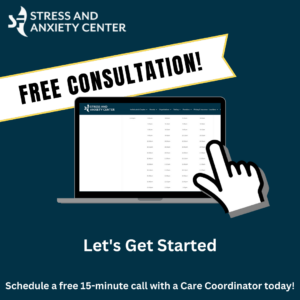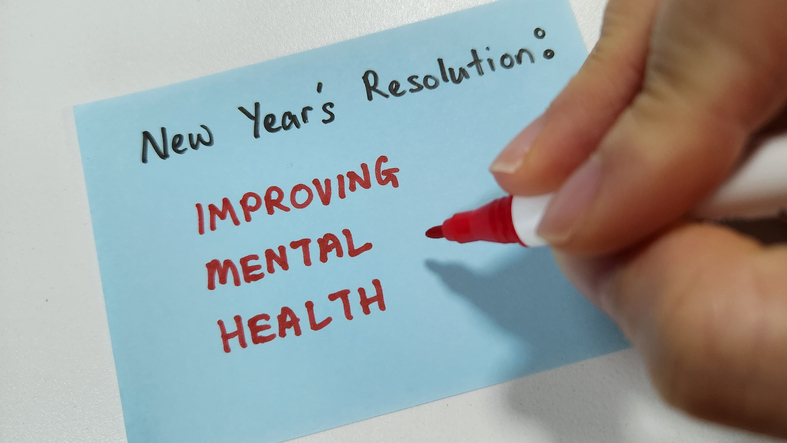No matter what job you have, it’s normal to occasionally feel anxiety at work. Taking on a new responsibility, giving a presentation to a group, or facing a looming deadline can all ratchet up the pressure, leaving you feeling nervous about performing to expectations and to the best of your ability. However, the anxiety and stress some people experience at work go well beyond the ordinary jitters you might feel over a temporary professional challenge. When anxiety is excessive and/or persistent, it can become debilitating, interfering not only with your ability to do your job effectively, but also with your overall well-being.
Unfortunately, workplace stress that can contribute to anxiety is an all-too-common phenomenon. According to the Occupational Health and Safety Administration, 83% of U.S. workers suffer from work-related stress, with 54% of workers reporting that their home life is affected by work stress. With work-related stress so prevalent, it can be difficult for people to immediately perceive that the level of anxiety they’re experiencing on the job is not healthy. Anxiety and stress do not have to be an invariable feature of professional life, however—it is possible to learn how to reduce anxiety at work for better mental health both in and away from the office.
What Does Workplace Anxiety Look Like?
When people struggle to cope with anxiety at work, that difficulty can manifest in myriad ways. You might find your stomach in knots on Sunday night at the prospect of working the next day. Maybe you procrastinate on work-related tasks, paralyzed into inaction by your anxiety. Or perhaps you can’t focus on what you need to do and end up rushing through assignments or missing key details because you’re so overwhelmed. You may also increasingly avoid new projects, meetings, or work events. While at first, you may be able to power through your symptoms to try to stay on top of your responsibilities, over time, your work performance, work quality, and relationships with your colleagues can suffer.
Physical symptoms can also accompany anxiety about work. These may include headaches, gastrointestinal upset, insomnia (that doesn’t have any other obvious causes), tension and/or muscular pain, fatigue, nausea, dizziness, or even full-blown panic attacks. You may miss work more and more often, either coming in late or taking sick days because your anxiety has become so intense.
If any of this sounds familiar, it’s also likely that you’re not even sure when your work anxiety became unbearable. It doesn’t have to stay that way, though.
Tips to Manage Anxiety at Work
There are many strategies for reducing work anxiety, and doing so successfully will require a multi-pronged approach. Here are a few tips on how to manage anxiety at work so you can be happier and more productive at your job.
Pay attention to your overall wellness: While good nutrition, adequate sleep, and regular exercise won’t solve anxiety problems on their own, the lack of them will almost certainly exacerbate the physical and mental symptoms of anxiety. Try to avoid using too much caffeine, alcohol, or other substances as well.
Identify your triggers: Workplace stress and anxiety can spring from a variety of sources: The pressure to meet deadlines. High-stakes presentations for upper management or clients. Conflict with difficult coworkers. Take note of the situations that provoke your anxiety, as this information will help point the way to solutions.
Develop coping techniques: Because it is so easy to get swept up in worry, you should practice coping strategies that will help calm you and keep you grounded in the present moment when you feel anxiety start to build. This might mean meditation techniques, listening to music, breathing exercises, taking a quick walk—what works is highly individual, so experiment to find what works best for you.
Communicate with your employer: Some people may hesitate to tell their employer when they’re struggling with anxiety, and whether you do so is a personal choice. However, the Americans with Disabilities Act (ADA) is designed to protect employees from discrimination due to a physical or mental disability when they are otherwise qualified to do their job, so you should not assume that being honest will have a catastrophic effect on your career. Moreover, speaking up allows your workplace to put reasonable accommodations in place that can help in reducing anxiety or to correct situations that are unintentionally contributing to your stress. For example, if a too-heavy workload or inadequate training is part of the problem, it’s important to let management know so that solutions can be found.
Set healthy boundaries: Some work anxiety can stem from a lack of work-life balance when it feels like you can’t ever escape work responsibilities. Make sure you have clear separations that define your workday, even if you work remotely—this means setting specific hours in which you don’t check your email or work messages and having a defined work space, so you have regular downtime to decompress.
Take advantage of employer-provided resources: If your company offers an employee assistance program, see if it provides benefits that might help you manage your anxiety. Other perks, such as a gym membership, may also help by facilitating useful coping strategies.
Consult a mental health professional: A therapist or counselor can provide valuable expertise and outside perspective on your situation. Often people are inspired to look for a therapist when they’ve already tried to manage anxiety on their own without success, but seeking professional advice doesn’t have to wait until things feel out of control. A mental health professional can help you figure out the cause of your anxiety and make effective changes to reduce it.
Finding Relief from Anxiety at Work
At the SF Stress and Anxiety Center, we help clients suffering from work anxiety develop psychological resilience and find balance with evidence-based practices grounded in research. With both in-person and online therapy sessions available, we make treatment accessible no matter how busy your schedule. To be matched with the right specialist who can help you feel more in control of your career and your life, schedule your free introductory phone call with one of our compassionate Care Coordinators today.






